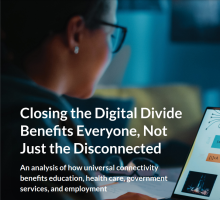
A new report from the American Civil Liberties Union (ALU) examines municipal networks as a way to protect network neutrality and privacy, and to improve local access to broadband. The report, titled The Public Internet Option, offers information on publicly owned networks and some of the most common models. The authors also address how community networks are better positioned to preserve privacy, bring equitable Internet access across the community, and honor free speech. There are also suggestions on ways to begin a local community network initiative.
Preserving Online Expectations
The ACLU report dives into the changes the current FCC have made that have created an online environment hostile toward preserving privacy and innovation. When FCC Chairman Ajit Pai and the Republican Commissioners chose to repeal federal network neutrality protections, they handed a obscene amount of power to already overly-powerful corporate ISPs. Ever since that decision, local communities have been looking for alternatives.
Authors of the report describe the ways local communities are using their existing assets and investing in more infrastructure in order to either offer connectivity themselves or work with private sector partners. In addition to having the ability to require network neutrality from partners, communities with their own infrastructure are able to take measures to protect subscribers’ data and implement other privacy protections. The current administration removed privacy protections for subscribers in 2017.
The ACLU offers best practices that rely on three main principles:
1. High-speed broadband must be accessible and affordable for all.
2. Community broadband services must protect free speech.
3. Community broadband services must protect privacy.
Within each principle, the report offers specific information and considerations. As we would expect from the ACLU, they cover the principles as they intercept between individual freedoms, human rights, and the practicalities of municipal networks. We were happy to help out with information from our map and articles, and we're pleased the authors suggest MuniNetworks.org as a clearinghouse of information to get people started on educating themselves.
From the conclusion:
There are many reasons for Americans to want their municipalities to offer broadband directly or indirectly to their residents. With internet service becoming ever more central to modern social, political, economic, and political life, access to functional and affordable broadband, like access to running water and electricity, must be available to all. Given the poor choices offered to so many Americans by corporate broadband carriers, many cities are finding they need to take matters into their own hands. And as the Trump-era FCC works to terminate important protections for the integrity and privacy of communications, many Americans are also deciding they want a broadband provider that they can trust and that is locally accountable and responsive.
As cities respond to these needs by providing internet access, they must take care to respect constitutional values of free speech and privacy and to ensure that access is provided equally to all. And communities that don’t offer Internet services should consider doing so as a way to advance and protect those values.







